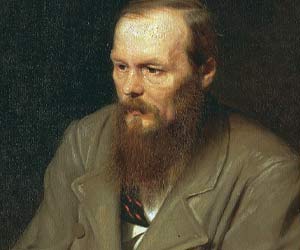Crime and Punishment (Barnes and Noble Classics)
Select Format
Select Condition 
Book Overview
Crime And Punishment By Fyodor Dostoevsky
Format:Hardcover
Language:English
ISBN:1566194326
ISBN13:9781566194327
Release Date:January 1994
Publisher:Barnes & Noble
Length:464 Pages
Weight:1.48 lbs.
Customer Reviews
5 ratings
Book condition
Published by C , 5 months ago
Haven’t read the book yet, purchased it in good condition and it was pretty beat up. Looking forward to reading this regardless, just disappointed in the condition it was sent in.
Book condition
Published by Anonymous , 3 years ago
As described
Viruses of the mind
Published by Thriftbooks.com User , 15 years ago
Crime and Punishment is a skillfully done and engaging read that brings terrifying philosophies to life. Considering the book uses 500 pages to describe the events of a month of so, this might seem to be a dry a boring read. This is not so, for the book moves along at a fast clip and offers a compelling, deep perspective that is not found very often today. Crime and Punishment is about many philosophic ideas. The "Extraordinary Man" theory is one of them, the redemptive nature of suffering another. In particular, however, I was struck by a certain aspect that does not emerge fully until the epilogue. While sick, Raskolnikov has a dream (p.518): "...the whole world was condemned to suffer a terrible, unprecedented, and unparalleled plague, which had spread to Europe from the depths of Asia. Except for a small handful of the chosen, all were doomed to perish. A new kind of trichinae had appeared, microscopic substances that lodged in men's bodies. Yet these were spiritual substances as well, endowed with mind and will. Those infected were seized immediately and went mad. Yet people never considered themselves so clever and so unhesitatingly right as these infected ones considered themselves. Never had they considered their decrees, their scientific deductions, their moral convictions and their beliefs more firmly based. Whole settlements, whole cities and nations were infected and went mad. Everybody was in a state of alarm, and nobody understood anybody; each thought the truth was in him alone; suffered agonies when he looked on others; beat his breast; wept and wrung his hands. They did not know whom to bring to trial or how to try him; they could not agree on what to consider evil, what good. They did not know whom to condemn or whom to acquit." Of course, Dostoyevsky is talking about ideas that spread from one person to another. Russia at this time was a changing place. Notions of Hegelian "historical necessity" had invaded Russia and were influencing revolutionary movements. Revolutionaries and intellectuals thought that if things were historically necessary, and if society advanced through contradiction and negation, this idea would justify potentially immoral means of reaching their ends. Of course, this is part of the reason that Raskolnikov committed the murder. Raskolnikov thought that truly great men are able to transgress the law in order that their greatness can come forth for the benefit of society. The murder is committed as a test of the murderer's "greatness." If Raskolinov can carry through with the murder and its aftermath, then he can prove to himself that he is a great man. It is implied that Raskolnikov eventually realizes that his idea was wrong while exiled in Siberia. Dostoyevsky himself was exiled to Siberia for engaging in revolutionary activities in this Hegelian framework. While there, Dostoyevsky underwent (as far as can be determined) a genuine return to Russian Orthodoxy. Upon his return to Petersburg, he beca
Wonderful new translation
Published by Thriftbooks.com User , 23 years ago
Crime and Punishment centers upon the story of a young Russian student, Raskolnikov, who plots and carries out a brutal murder. However, this is less than a quarter of the story. The rest centers upon his attempts to come to terms with the philosophical and psycological consequences of his act. Aiding, or hindering, him in this endevor are a series of characters from the kind-hearted prostitute Sonia and her drunken father, the unrepentant scoundrel Svidrigailov, Raskolnikov's best friend Razumihin, and the police detective come amateur psychologist Porfiry Petrovich. Though the story develops slowly, with many detours, Raskolnikov's journey through crime and punishment remains gripping until the very last page.I first encountered Crime and Punishment in the classic translation by Constance Garnett and loved it for Dostoyevsky's careful balance of character and philosophy. Dostoyevsky's genius lies in his ability to create simultaneously a psychological novel and a novel of ideas. Though each character represents a certain philosophy of life, they never become lifeless or stereotyped. Instead, each is a memorably developed and psychologically deep person, who could easily carry a story in their own right. Dostoyevsky's genius is in the perfect counterpoint between conflict of personality and conflict of philosophy between each of these fascinating people. Dostoyevsky also specializes in garnering the reader's interest and sympathy for the most unlikely characters. This is a novel, after all, with an ax murderer as the protagonist.However, until I read this new translation of Dostoyevsky, I never realized that besides psychologist and philosopher, Dostoyevsky was also a masterful stylist. Pevear and Volokhonsky succeed in faithfully translating the literal meaning of the original Russian, while still capturing the vivid liveliness of Dostoyevsky's prose. The heat of a St. Petersburg summer night fairly radiates off the page in the first part, while his descriptions of Raskolnikov's cramped bedroom gave me claustrophobia.Admittedly, this is no beach-read thriller. The Russian names can be confusing, and Dostoyevsky's manages to be both dense and long-winded. Nontheless, this is one of the greatest works of fiction ever written that should be read both as a "classic book" and as a gripping psychological exploration of crime.
Detective Novel? Not quite.
Published by Thriftbooks.com User , 24 years ago
This is the first Dostoevsky book I have read, and I liked it immensely. I decided to read it because of the intriguing plot, as well as Dostoevsky's reputation. Something interesting about this novel is that Dostoevsky used a very "backwards" sort of character development. He had Raskolnikov commit a murder- with no apparent motive- and then spent the rest of the book exploring the character, rather than the other way around. So first we watch this character commit a horrible, terrible crime, one that we should denounce him for, and then we begin to get to know him, and he is revealed to have an astoundingly good character after all. I found myself liking Raskolnikov greatly, and I was able to identify with him as well. However, this book does not seem to fall under the guidelines of a "crime novel" nor a "psychological thriller". Yes, there is a crime, as well as a study of the protoganist's psyche, but it is not exactly thrilling. This is not the sort of story where you have to keep reading and reading to find out who committed the crime. You already know. Therefore, there is no mystery to keep you interested. Despite all these obstacles, Dostoevsky does what might be impossible for most writers. He makes you care about what happens to Raskolnikov. I was not thrilled, but engrossed. What kept me reading here was the desire to see if Raskolnikov would defeat his inner demons and turn himself in, or be arrested. I'd rather not reveal the ending but I would like to say that I found it extremely satisfying. The subplot, that of Luzhin trying to gain control over Dounia, might have only gotten in the way of another writer, but Dostoevsky was able to inspire such hate in me for Luzhin that I wanted to keep reading just to see him get what he deserved in the end. After reading this, I have decided to read Dostoevky's other works as well, and hopefully they will all be of the same high quality.
Crime and Punishment Mentions in Our Blog

A Life in Books: 9 of Fyodor Dostoevsky's Defining Works
Published by Ashly Moore Sheldon • January 15, 2021
Fyodor Dostoyevsky's successful first book, Poor Folk, came out 175 years ago today when the author was only 24 years old. But in a life beset by drama worthy of, say, a Russian novel, it would be many years before he produced a notable follow-up. Here we explore the literary giant’s best books and how they mirror his extraordinary life.

The Great American Read on PBS
Published by Beth Clark • August 03, 2018
The Great American Read is a PBS series that explores and celebrates the power of reading as the core of an ambitious digital, educational, and community outreach campaign designed to get the country reading and passionately talking about books. One hundred books, to be exact, so as promised, here are the next 20!





